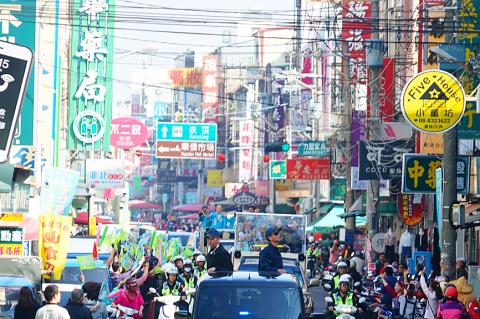President Tsai Ing-wen (蔡英文), the Democratic Progressive Party’s (DPP) presidential candidate, yesterday began a five-day motorcade campaign in the run-up to Saturday’s elections.
The motorcade set off from Pingtung County’s Fenggang Village (楓港), her ancestral home, yesterday.
Four years ago in the final week prior to the 2016 elections, she started a similar campaign event in Pingtung, where she experienced the most hospitality, Tsai said, adding that she looked forward to seeing poll results from her hometown the most.

Photo: Chen Yen-ting, Taipei Times
At noon, the motorcade arrived in Kaohsiung, where Tsai was joined by several DPP legislative candidates to seek support throughout the city.
The motorcade arrived in Tainan in the afternoon, where the Tainan Police Bureau mobilized nearly 900 peacekeeping officers to ensure a smooth tour.
Tsai rode behind bulletproof glass in the back of a jeep as she waved to onlookers.
The National Security Bureau has arranged for a vehicle of the same model to follow Tsai to minimize security risks, such as a malfunction of the primary vehicle, a bureau official said.
Later yesterday, Tsai attended a rally in Yunlin County’s Douliou City (斗六), before another rally in Chiayi City in the evening.
Separately yesterday, Tsai’s campaign office in Taipei released a video called “Speak Loudly” (大聲說話), which highlights how precious democracy is by contrasting peace and freedom in Taiwan with clashes and turmoil in Hong Kong, where Beijing’s “one country, two systems” formula is implemented.
The elections could determine whether Taiwan moves away from dictatorship or toward it, which is why every Taiwanese must cast the right votes to speak loudly their determination to stand with democracy, freedom and the world, the video said.
The video was directed by Lo Ging-zim (羅景壬), who has received more than 10 awards at home and abroad, such as “Best Commercial of the Year” and “Best Director,” Tsai campaign office spokeswoman Chien Hsu-pei (簡舒培) said.
The video was to appeal to the electorate, asking them not to accept the “one country, two systems” formula or the so-called “1992 consensus,” Chien said, adding that the ballots on Saturday could show the world Taiwan’s firm resolution.
The “1992 consensus” — a term former Mainland Affairs Council chairman Su Chi (蘇起) admitted making up in 2000 — refers to a tacit understanding between the Chinese Nationalist Party (KMT) and Beijing that both sides acknowledge there is “one China,” with each side having its own interpretation of what “China” means.
Additional reporting by Lo Tien-pin

GENSLER SURVEY: ‘Economic infrastructure is not enough. A city needs to inspire pride, offer moments of joy and foster a sense of belonging,’ the company said Taipei was named the city with the “highest staying power” in the world by US-based design and architecture firm Gensler. The Taiwanese capital earned the top spot among 65 cities across six continents with 64 percent of Taipei respondents in a survey of 33,000 people saying they wanted to stay in the city. Rounding out the top five were Vietnam’s Ho Chi Minh City (61 percent), Singapore (59 percent), Sydney (58 percent) and Berlin (51 percent). Sixth to 10th place went to Monterrey, Mexico; Munich, Germany; Sao Paulo, Brazil; Vancouver; and Seoul. Cities in the US were ranked separately, with Minneapolis first at

The Japan-Taiwan Exchange Association has cautioned Japanese travelers to be vigilant against pickpockets at several popular tourist spots in Taiwan, including Taipei’s night markets, the Yongkang Street area, Zhongshan MRT Station, and Jiufen (九份) in New Taipei City. The advisory, titled “Recent Development of Concerns,” was posted on the association’s Web site under its safety and emergency report section. It urges travelers to keep backpacks fully zipped and carried in front, with valuables placed at the bottom of the bag. Visitors are advised to be especially mindful of their belongings when taking photos or speaking on the phone, avoid storing wallets and

Scoot announced yesterday that starting in October, it would increase flights between Taipei and Japan’s Narita airport and Hokkaido, and between Singapore and Taipei. The low-cost airline, a subsidiary of Singapore Airlines, also said it would launch flights to Chiang Rai in Thailand, Okinawa and Tokyo’s Haneda airport between December and March next year. Flights between Singapore and Chiang Rai would begin on Jan. 1, with five flights per week operated by an Embraer E190-E2 aircraft, Scoot said. Flights between Singapore and Okinawa would begin on Dec. 15, with three flights per week operated by Airbus A320 aircraft, the airline said. Services between Singapore

ENDORSING TAIWAN: Honduran presidential candidate Nasry Afura said that Honduras was ‘100 times better off’ when it was allied with Taipei The Ministry of Foreign Affairs yesterday said it would explore the possibility of restoring diplomatic relations with Honduras based on the principle of maintaining national interests and dignity. The ministry made the remarks in response to reporters’ questions regarding an article titled: “Will Taiwan Regain a Diplomatic Ally?” published in The Diplomat on Saturday. The article said Honduras’ presidential election in November could offer Taiwan the chance to regain an ally, as multiple candidates have promoted re-establishing diplomatic relations with Taiwan. Honduras severed diplomatic ties with Taiwan in March 2023 in favor of Beijing, but since switching its diplomatic recognition,